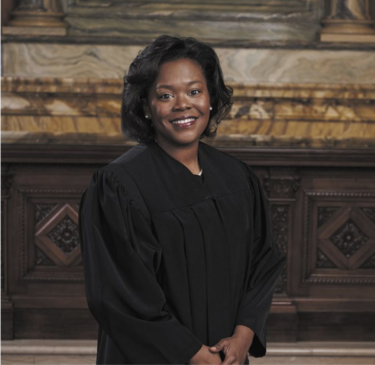NCJW supports Judge Doris L. Pryor. Here’s why:
Judge Doris L. Pryor currently serves as US Magistrate Judge for the Southern District of Indiana. Previously, she clerked under Judges of the US Court of Appeals for the Eighth Circuit and the US District Court of the Eastern District of Arkansas, worked as a public defender, and served in various legal roles for the Southern District of Indiana. She founded the Re-entry And Community Help (REACH) program in the Southern District of Indiana, which helps formerly incarcerated individuals access housing, employment, and other public assistance programs. If confirmed, Judge Pryor would serve as the first woman of color on the Seventh Circuit.
Judge Doris L. Pryor’s stance on important issues:
Criminal Justice:
Judge Pryor has worked to advance criminal justice by founding the Southern District of Indiana’s Re-entry And Community Help (REACH) program in 2007. The REACH program assists formerly incarcerated people, who are at high-risk of recidivating, in accessing resources and services to facilitate their transition back into the community.
Judicial Temperament:
Over the course of her time as a Magistrate Judge, Judge Pryor has gained a reputation for skillfully handling complex cases. Her colleague, Southern Indiana District Court Chief Judge Pratt, has described Judge Pryor as having a “great personality,” which quickly connects with those who appear before her, and that she has an expertise in finding common ground. Judge Pratt has said that the Southern Indiana District Court “look[s] forward to her grading our papers.” Senator Todd Young (R-IN) has expressed his support for Judge Pryor’s nomination, stating that “her legal experience and expertise would make her an asset to the Seventh Circuit.”
Experience (and Pro Bono Work):
Judge Pryor clerked for Chief Judge Lavenski Smith of the US Court of Appeals for the Eighth Circuit from 2003-2004 and Judge J. Leon Holmes of the US District Court of the Eastern District of Arkansas from 2004-2005. Following her clerkships, Judge Pryor served as a Deputy Public Defender in the State of Arkansas Public Defender’s Commission. In 2006, she worked as an Assistant United States Attorney for the Southern District of Indiana. Then, in 2014 she was appointed as the National Security Chief for the United State’s Attorney’s Office for the Southern District of Indiana. In 2018, Judge Pryor was appointed US Magistrate Judge for the Southern District of Indiana.
Education and Awards:
Judge Pryor earned her BS in 1999 from the University of Central Arkansas and her JD in 2003 from the Indiana University Maurer School of LawIn 2018, Judge Pryor received the US Attorney’s Office Director’s Award from the Center for Leadership Development.
Professional Affiliations:
Judge Pryor has served as the program chair, and previously as the secretary and newsletter chair, for the Indianapolis branch of the Federal Bar Association. She has also chaired the Indianapolis Bar Association Diversity Job Fair’s Student Workshop in the past. Judge Pryor has worked as a board member of Goodwill Education Initiatives, Inc. In addition, she has been actively involved with her former law school, where she has taught courses and delivered a keynote address to the 2021 incoming class.
